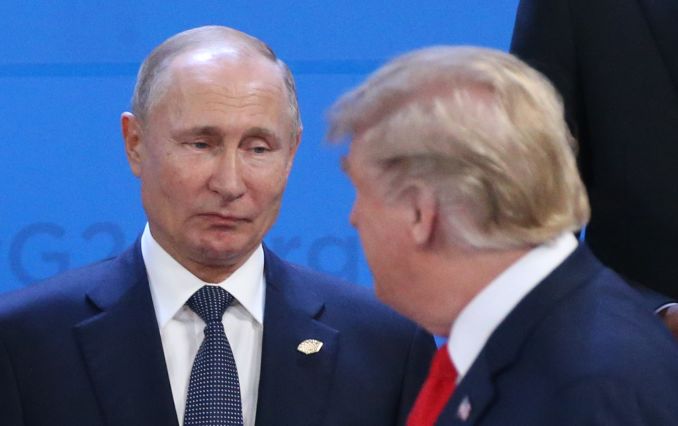Russia Given 60 Days NATO to Follow Along with Nuclear Pact
Trump and Putin during a previous G20 Summit’s Plenary Meeting on November 30 to discuss a nuclear deal.
January 23, 2019
Secretary of State, Mike Pompeo, announced on Tuesday, December 4 that the US will leave the Intermediate-Range Nuclear Forces (INF) Treaty should Russia not agree to the terms that were made in the agreement. The treaty prohibits the production or testing of ground-launched cruise missiles with a range of 300 to 3400 miles (roughly 500 to 5,000 kilometers), according to CNBC. This is crucial because it would be signed by the world’s two biggest nuclear powers.
The INF was a treaty signed back in 1987 between former US President, Ronald Reagan, and former Soviet leader, Mikhail Gorbachev, in order to end the overhanging threat of the Cold War. It “prohibited the development and deployment of midrange nuclear-tipped missiles,” according to CNBC. This resulted in both countries deconstructing over 2,500 missiles each.
Russia has been developing “multiple battalions of the SSC-8 missiles,” said Pompeo in a statement, clearly going against the terms made in the treaty.
According to NATO in a joint statement, “Russia’s violation of the INF Treaty erodes the foundations of effective arms control and undermines Allied security. This is part of Russia’s broader pattern of behavior that is intended to weaken the overall Euro-Atlantic security architecture.”
Just last month, Trump threatened to withdraw the US from the INF Treaty, removing any restraint on the US’s side for the development and use of nuclear weapons as well, CNBC stated. Alongside this, NATO gave Russia 60 days to agree with the original terms before the US went through with leaving as well. The Washington Post claimed that this ultimatum was made with the hopes of postponing any potential action Russia may or may not have planned with their missiles.
“[Their missiles’] range makes it a direct menace to Europe,” Mike Pompeo said after a meeting with several NATO officials.
The threat of the US leaving the treaty has also brought back old fears of international tensions and bringing back yet another Cold War, the very thing the INF Treaty was created to end. Especially now that technology has made more advancements over the years, the risk is even higher.
“It makes no sense for the United States to remain in a treaty that constrains our ability to respond to Russia’s violations,” Pompeo said after a meeting of NATO foreign ministers, according to the Washington Post. “We hope that they’ll change course, but there’s been absolutely no indication that they’ll do so.”
So far, Russia has made no move towards accepting or rejecting the treaty, but NATO has done what they can to urge Russia into fulfilling their end of the deal. Now all there is to do is wait for them to make their move.





































